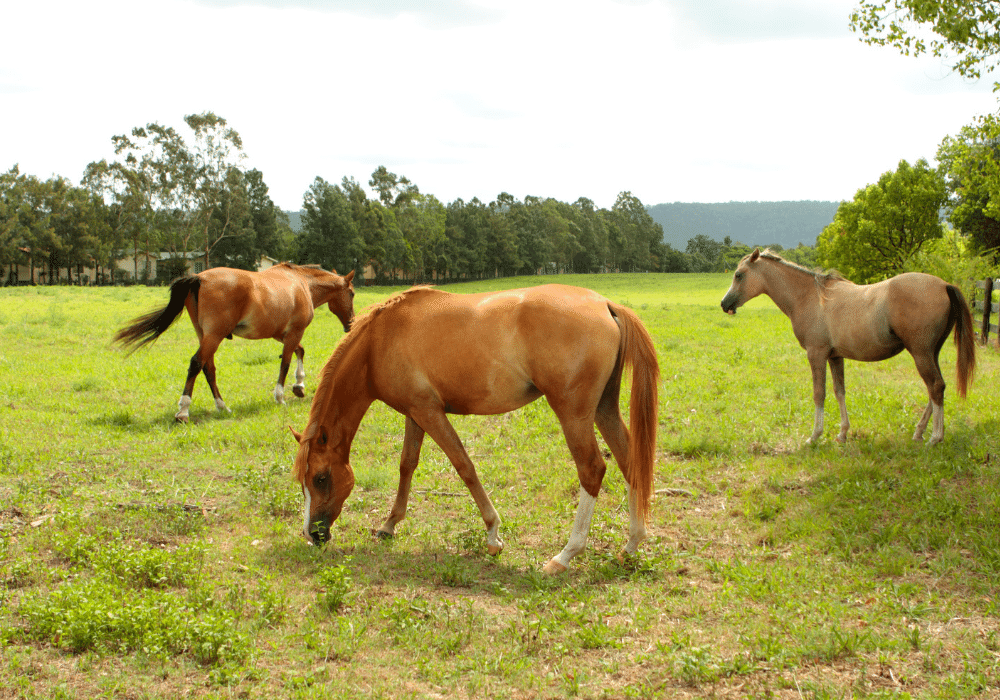Having enough space to roam and graze is vital for a horse’s health and wellbeing, and as a horse owner, it is your responsibility to ensure that the needs of your equines are met. We are often asked, ‘How much land does a horse need?’, and we are always happy to advise owners on how best to manage their horse’s turnout.
In this blog post, we’ll advise on how much land you need for your horse, the negative impact of too little grazing, and how best to manage less-than-optimal land.
How Much Land Do I Need for a Horse?
While the amount of land you need for a horse can depend on a few factors, there is some official advice to go by. For a horse who is kept out 24/7 year-round, it’s advised that you have at least 1.5 acres. Any additional horses require another acre per horse. Three horses, for example, would require a minimum of 3.5 acres.
However, it is unusual for owners to turn their horses out year-round 24/7, so if you bring your horses in for part of the day or at night, you could get by on slightly less. Owners with less land will need to strictly manage their grazing, including restricting access to the grass in wet weather, supplementing the fields with forage, or even sectioning off a ‘trash paddock’ for the wetter months.
While it’s possible to manage on limited grazing, it’s important that the horse’s physical and mental wellbeing are prioritised, and in most cases, this includes providing daily turnout.
The Dangers of Overstocking
Keeping too many horses on too little land is known as ‘overstocking’ and this can lead to several health and welfare-related problems, as well as damage to land.
Too small a grazing area can lead to ‘overgrazing’, which will cause nutritional deficiencies in the soil. Heavy footfall can damage the soil, leading to reduced fertility and growth later in the year. Overstocking in the wetter months especially can lead to even less grazing later in the year - as the grass becomes damaged beyond repair.
Overstocking can also increase the risk of stress among horses. If too many horses are competing for limited resources, injuries can occur. While some horses will have enough forage, others may go without due to being lower in the hierarchy. If the field becomes overgrazed and bare, horses can become stressed and the risk of gastric ulcers can increase.
Good pasture management is vital when it comes to controlling worms. Overgrazing can lead to the paddock becoming ‘horse sick’, which makes it the ideal environment for worms to thrive.
Managing a Small Amount of Land
While there are ways to manage a small acreage, it’s very important to do so without compromising the welfare of the horse. Turnout is always optimum, but there are ways to manage smaller amounts of grazing without reducing the amount of turnout you can offer your horses. In this instance, it is important to be organised, so that you don’t sacrifice your spring and summer grazing.
You should ensure your horses always have enough forage, even if this means supplementing hay or haylage in the winter or during a very dry summer when the grass growth slows. To help control worms, you should remove droppings, ideally every day. You should also conduct regular worm counts, treating your horses with the appropriate wormer if needed.
Some horse owners offer their horses alternative turnout options. For instance, they may turn their horses out in an arena or a specially designed turnout pen in the winter months. While not the same as turning horses out in a large field to roam, it does mean that horses can still stretch their legs and move, even when grazing is restricted.
Avonvale Equine Vets
We are an independent equine vet practice based near Banbury. Our coverage area includes Warwickshire, Worcestershire and the Cotswolds, and we offer routine healthcare and emergency vet services. and If you require any additional advice on how much land you need for your horse, or how to manage your grazing, our equine vets are always happy to help. Please contact us on 01295 670 501.








